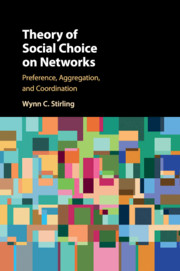Book contents
- Frontmatter
- Dedication
- Contents
- List of Figures
- List of Tables
- Preface and Acknowledgments
- Introduction
- 1 Preference
- 2 Aggregation
- 3 Deliberation
- 4 Coordination
- 5 Randomization
- 6 Satisficing
- Appendix A Dutch Book Theorem
- Appendix B Bayesian Networks
- Appendix C Probability Concepts
- Appendix D Markov Convergence Theorem
- Appendix E Entropy and Mutual Information
- Bibliography
- List of Authors
- Index
2 - Aggregation
Published online by Cambridge University Press: 05 September 2016
- Frontmatter
- Dedication
- Contents
- List of Figures
- List of Tables
- Preface and Acknowledgments
- Introduction
- 1 Preference
- 2 Aggregation
- 3 Deliberation
- 4 Coordination
- 5 Randomization
- 6 Satisficing
- Appendix A Dutch Book Theorem
- Appendix B Bayesian Networks
- Appendix C Probability Concepts
- Appendix D Markov Convergence Theorem
- Appendix E Entropy and Mutual Information
- Bibliography
- List of Authors
- Index
Summary
Order is not pressure which is imposed on society from without, but an equilibrium which is set up from within.
— José Ortega y Gasset Mirabeau: An Essay on the Nature of Statesmanship, 1975Social choice involves two distinct problems: defining a mechanism for expressing individual preferences, and defining a mechanism for aggregating individual preferences. Chapter 1 extended the notion of individual preference to account for explicit social relationships that exist in a social network by introducing a mechanism whereby individuals can incorporate the welfare of others into their own welfare, thereby allowing them to form their preferences in the context of a social engagement. The resulting preference relationships are no longer constrained to be categorical – they can be conditional. This change in preference structure requires a corresponding change in the concept of aggregation.
Under the classical formulation of social choice, aggregation is the process by which the individual categorical preference orderings are combined to prescribe a choice for the collective. Under an expanded formulation, however, aggregation is not merely the issue of how to map a set of individual preferences into a social choice. Rather, the issue is how to create a comprehensive social model that characterizes the relationships that are formed as the conditional preferences propagate through the society, from which a social choice can be deduced that takes all such social relationships into consideration.
To appreciate the difference between classical aggregation and the expanded concept, we first review the classical approach.
Classical Aggregation
The ideal concept of aggregation, as conceived by Arrow and others, is the existence of an inherent “constitution” that would govern society according to generally agreed upon rules and conventions. Establishing the existence of such a process would be a profound accomplishment, and it would be even more impressive and useful if the existence proof were constructive; that is, if existence were demonstrated by actually specifying the aggregation mechanism. The result would be a formula by which collective decisions could be made in a way that could be incontrovertibly justified as being in the best interest of the society.
Definition 2.1 Let L(A) denote the set of linear orderings over A.
- Type
- Chapter
- Information
- Theory of Social Choice on NetworksPreference, Aggregation, and Coordination, pp. 32 - 73Publisher: Cambridge University PressPrint publication year: 2016



